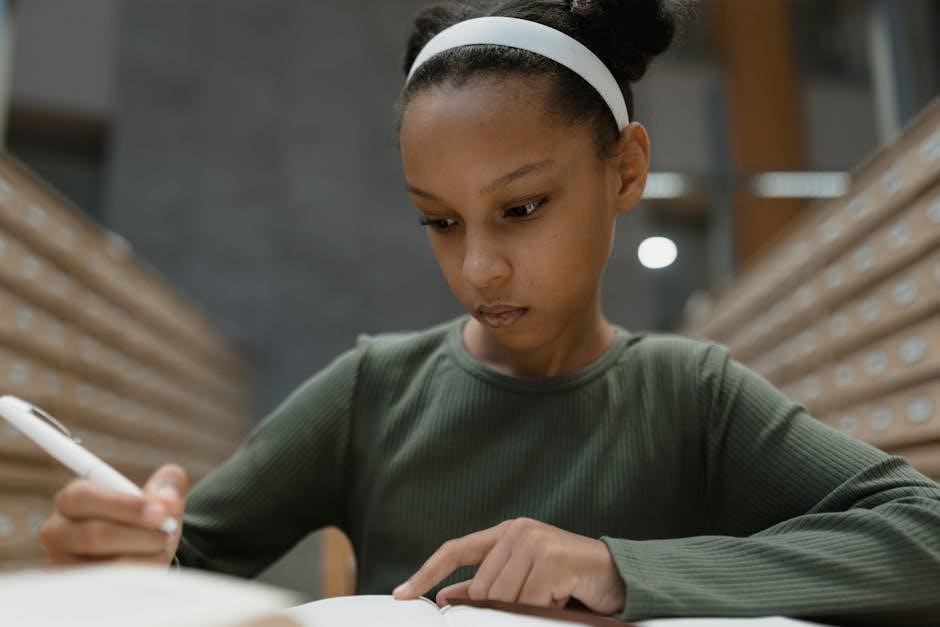Sean Covey’s The 7 Habits of Highly Effective Teens offers a powerful guide for adolescents to master essential life skills, fostering personal growth and success.
Overview of the Book and Its Importance
The 7 Habits of Highly Effective Teens by Sean Covey is a transformative guide tailored for adolescents, offering practical advice to navigate life’s challenges. Based on Stephen Covey’s timeless principles, this book equips teens with essential life skills, fostering self-esteem, empathy, and responsibility. The PDF version provides accessible wisdom, including real-life stories, quotes, and actionable tips, making it a must-read for teens striving to build a balanced and fulfilling life. Its relevance and engaging approach have made it a trusted resource for personal growth and success.
Who Is Sean Covey and His Vision for Teen Success
Sean Covey, son of Stephen Covey, is a renowned author and motivational speaker dedicated to empowering teens. His book, The 7 Habits of Highly Effective Teens, adapts his father’s timeless principles for adolescents, focusing on self-esteem, empathy, and responsibility. Covey’s vision is to equip teens with practical tools to navigate life’s challenges, fostering personal growth and success. Through engaging stories, quotes, and real-life examples, he inspires teens to embrace habits that promote a balanced, purposeful life, making him a trusted voice in youth development and empowerment.

Habit 1: Be Proactive
Habit 1: Be Proactive emphasizes taking control of actions and reactions, encouraging teens to pause, reflect, and choose responses wisely, fostering personal responsibility and maturity.
Understanding Proactivity and Its Impact on Teen Life
Proactivity is about taking ownership of choices and actions, focusing on what can be controlled. It empowers teens to shift from reacting to circumstances to leading their lives intentionally. By being proactive, teens build self-esteem, reduce stress, and develop a growth mindset. This habit encourages them to pause, reflect, and choose responses wisely, fostering maturity. Proactivity is the foundation for other habits, helping teens navigate challenges confidently and create positive outcomes in their personal and social lives.
Practical Steps to Take Control of Your Actions and Reactions
To embrace proactivity, teens can start by recognizing their ability to choose responses. Pause before reacting, assess the situation, and focus on what you can control. Practice self-awareness to identify triggers and patterns. Shift from blaming circumstances to solving problems. Take initiative in small ways, like completing tasks without being reminded. Celebrate progress, no matter how small, to build confidence. These steps help teens move from reactive to proactive, fostering a mindset of responsibility and empowerment in daily life.

Habit 2: Begin with the End in Mind
This habit encourages teens to envision their future, set long-term goals, and create a personal mission statement. It helps them align daily decisions with their values and aspirations, fostering self-direction and clarity in life.
The Power of Goal-Setting for Teens
Goal-setting is a foundational habit that empowers teens to clarify their values, prioritize their time, and focus on what truly matters. By envisioning their future and setting clear, achievable objectives, teens can align their daily actions with their long-term vision. This habit encourages breaking down large goals into manageable steps, fostering accountability and self-discipline. Writing down goals and tracking progress helps teens stay committed and motivated, building confidence and resilience. Effective goal-setting guides teens to create a roadmap for success, enabling them to make intentional decisions that align with their personal mission and aspirations;
Creating a Personal Mission Statement
A personal mission statement is a powerful tool that helps teens define their purpose, values, and long-term vision. It serves as a guide for making decisions and staying focused on what truly matters. By reflecting on their beliefs, strengths, and aspirations, teens can craft a statement that resonates with their unique identity. This habit encourages self-reflection and clarity, enabling teens to align their actions with their core values. A well-crafted mission statement becomes a compass, helping them navigate life’s challenges and stay committed to their personal goals and aspirations.
Habit 3: Put First Things First
Focus on prioritizing tasks to manage time effectively, ensuring important activities come first. This habit teaches teens to balance responsibilities and leisure for a productive lifestyle.
Time Management Strategies for Teens
Effective time management is crucial for teens to balance school, activities, and personal life. Prioritize tasks using the Eisenhower Matrix: focus on urgent and important activities first.
Use calendars or planners to organize daily schedules and set realistic goals. Avoid procrastination by breaking tasks into smaller, manageable steps.
Learn to say “no” to non-essential commitments, reducing stress and increasing productivity. By mastering these strategies, teens can achieve their goals while maintaining a healthy work-life balance.
Prioritizing Tasks Effectively
Prioritizing tasks is a cornerstone of effective time management. Sean Covey suggests using the Eisenhower Matrix to categorize tasks into four quadrants: urgent and important, important but not urgent, urgent but not important, and neither urgent nor important. Focus on tasks in the first quadrant to maximize impact. Additionally, teens should learn to delegate or eliminate less critical tasks. Regularly reviewing and adjusting priorities ensures alignment with long-term goals. By mastering this skill, teens can reduce stress and achieve greater productivity in their daily lives.

Habit 4: Think Win-Win
Think Win-Win encourages teens to seek mutually beneficial solutions, fostering respect and collaboration in relationships. This habit promotes a mindset of fairness and long-term success.
Cultivating a Mindset of Mutual Benefit
Cultivating a win-win mindset involves seeking solutions where everyone benefits, fostering trust and stronger relationships. This habit encourages teens to think beyond their own needs, promoting fairness and collaboration. By valuing others’ success, teens build a positive reputation and create opportunities for mutual growth. A win-win approach not only enhances personal relationships but also prepares teens for future professional interactions, teaching them that success is not a zero-sum game. This mindset is key to long-term success and fulfillment in both personal and professional spheres.
Building Positive Relationships
Building positive relationships is a cornerstone of personal and social success. Teens can foster strong connections by practicing empathy, active listening, and mutual respect; Understanding others’ perspectives helps bridge gaps and resolves conflicts. By being reliable, supportive, and genuine, teens create trust and loyalty in their relationships. Positive relationships also encourage collaboration and mutual growth, helping teens navigate social dynamics effectively. Cultivating these skills leads to stronger, more meaningful connections and a supportive network that contributes to their overall well-being and success in life.

Habit 5: Seek First to Understand, Then to Be Understood
Active listening and empathy are key to understanding others. By asking questions and seeking perspectives, teens build trust and foster open communication, strengthening relationships and resolving conflicts effectively.
The Importance of Active Listening
Active listening is crucial for building trust and understanding in relationships. It involves focusing fully on the speaker, asking questions, and seeking clarity. By truly hearing others, teens can avoid misunderstandings and resolve conflicts more effectively. Sean Covey emphasizes that listening with empathy fosters deeper connections and mutual respect. This habit encourages teens to prioritize understanding over being understood, creating a foundation for open and honest communication. Mastering active listening helps adolescents navigate social challenges and strengthen their interpersonal skills, leading to more meaningful relationships and personal growth. It is a cornerstone of effective communication and empathy.
Empathy and Communication Skills
Empathy and strong communication skills are essential for building meaningful relationships and understanding others’ perspectives. Sean Covey’s book emphasizes the importance of connecting deeply with others by being empathetic and clear in interactions. Teens learn to communicate effectively by expressing their thoughts respectfully and actively seeking to understand others. This fosters trust, resolves conflicts, and strengthens bonds. By mastering these skills, teens can navigate social challenges more confidently and foster positive connections, which are vital for personal and social growth. Empathy and communication are key to becoming highly effective in all areas of life.
Habit 6: Synergize
Synergizing involves combining strengths to achieve greater success than individual efforts. Teens learn to value teamwork, diversity, and collaboration, leading to innovative solutions and stronger relationships.
Combining Strengths to Achieve Success
Synergizing is about combining individual strengths to create something greater than the sum of its parts. By valuing diversity and collaboration, teens can achieve outcomes that surpass what they could accomplish alone. This habit encourages teamwork, open communication, and mutual respect, fostering a mindset where everyone’s unique talents contribute to a shared goal. Through synergizing, teens learn to embrace differences, think creatively, and solve problems more effectively. This collaborative approach not only enhances success but also builds lasting relationships and a sense of community. It’s a powerful way to turn challenges into opportunities for growth and innovation.
Teamwork and Collaboration
Teamwork and collaboration are vital for achieving shared goals and fostering meaningful relationships. By working together, teens can pool their talents, ideas, and efforts to accomplish far more than they could individually. This habit emphasizes the importance of valuing others’ contributions, communicating effectively, and building trust. When teens collaborate, they create a supportive environment where everyone feels valued and empowered. Teamwork also teaches the value of compromise, problem-solving, and adaptability. By learning to work well with others, teens develop essential skills that will benefit them in all areas of life, from school to future careers and personal relationships.
Habit 7: Sharpen the Saw
Habit 7 focuses on self-care and renewal, emphasizing the importance of maintaining a healthy balance in life. It encourages teens to recharge physically, emotionally, socially, and spiritually through activities like exercise, reflection, and connecting with others to sustain long-term success and well-being.
Self-Care and Personal Renewal
Habit 7 emphasizes the importance of self-care and personal renewal to maintain balance in life. Teens are encouraged to nurture their physical, emotional, social, and spiritual well-being through activities like exercise, reflection, and connecting with others. Regular self-care helps prevent burnout and fosters resilience, enabling teens to recharge and sustain their energy for long-term success. By prioritizing renewal, teens can cultivate a holistic approach to life, ensuring they are mentally and physically prepared to face challenges effectively while maintaining their overall well-being.
Maintaining Balance in Life
Maintaining balance is crucial for teens to manage the demands of school, relationships, and personal growth. By prioritizing activities that nourish both mind and body, teens can avoid burnout and achieve harmony. This involves setting boundaries, engaging in physical activity, and dedicating time for reflection and relaxation. Balance ensures that no single area of life dominates, allowing teens to pursue their goals while fostering meaningful connections and overall well-being. Striving for balance helps teens create a sustainable rhythm that supports long-term success and happiness.
The 7 Habits empower teens to embrace a balanced, purposeful life. By applying these principles, they can build strong relationships, achieve personal growth, and unlock their full potential.
How to Apply the 7 Habits in Daily Life
Start by being proactive—pause before reacting to situations. Set clear, personal goals and prioritize tasks to manage time effectively. Practice win-win thinking in relationships and seek to understand others before seeking to be understood. Collaborate with others to achieve synergy and focus on self-care to maintain balance. Reflect regularly on your actions and growth to sharpen your mind, body, and spirit. Incorporating these habits into daily routines can lead to lasting positive change and empowerment for teens.
The Long-Term Benefits of Adopting These Habits
Adopting the 7 Habits fosters long-term success by building self-discipline, resilience, and strong relationships. Teens develop a growth mindset, improving decision-making and problem-solving skills. These habits cultivate emotional intelligence and empathy, enhancing personal and professional relationships. Over time, they lead to greater confidence, accountability, and a balanced lifestyle. By instilling these principles early, teens lay a strong foundation for future achievements, becoming effective leaders and contributing positively to their communities.

